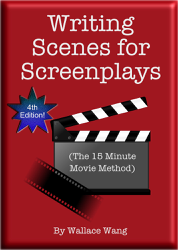The biggest mistake novices make when writing scenes is thinking the sole purpose of a scene is to give information about the story to the audience.
Wrong.
Giving information to the audience is never the purpose of any part of a screenplay. The real purpose of every scene (and every part of a screenplay) is to grab and hold someone’s attention. If your screenplay can’t grab and hold someone’s attention, nothing else will matter.
If you focus on giving information about your story in a scene, you’ll likely write a dull, flat, less than engaging scene. That means people will likely forget whatever information you’re trying to give them. The best way to give information to anyone is through an exciting, intriguing scene that grabs their attention and holds it. That way they’ll be so mesmerized by what’s happening that they’ll remember the crucial information your scene gives them to help them understand the story.
Pick up a novel you’ve never read before and flip to a random page. If what you read doesn’t grab and hold your attention, chances are good you won’t find any other part of that novel interesting either.
Screenplays work like that as well. Imagine someone flipping to a random page of your screenplay. If the text on that random page doesn’t grab and hold their attention, they’ll likely toss your script aside because they’ll know the rest of your screenplay probably won’t be worth reading.
Just as a chain is only as strong as its weakest link, so is a screenplay only as strong as its weakest scene. When you think the purpose of a scene is to give information about your story to the audience, you’ll likely write a dull scene.
Instead, if you focus on writing a scene that grabs and holds someone’s attention, you’ll write a far more dynamic scene. Then you can slip information about your story in that far more compelling scene and people will remember that information.
The purpose of every scene is to entertain the audience. How you do that depends on your particular story whether you want to evoke laughter, fear, anticipation, or excitement. The only wrong way to write a scene is to be boring.
Remember, nobody watches a favorite movie for the plot. They always watch a favorite movie for the emotional experience and that experience will be nearly impossible to achieve without knowing your story’s emotional logline first.

